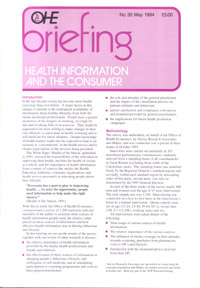Sign up to our newsletter Subscribe
Challenges and Solutions for Budget Impact Analysis of Gene Therapies

In the last decade society has become more health conscious than ever before. A major factor in this change of attitude is the widespread availability of information about healthy lifestyles from both the media and health professionals. People have a greater awareness of…
In the last decade society has become more health conscious than ever before. A major factor in this change of attitude is the widespread availability of information about healthy lifestyles from both the media and health professionals. People have a greater awareness of the dangers of smoking, of a high fat diet and of taking little or no exercise. They might be expected to be more willing to make changes in their own lifestyle, to participate in health screening and to self-medicate for minor ailments. Greater knowledge of health matters might also be expected to lead to an increase in ‘consumerism’ in the health service and to clearer expectations of the services being provided.
The White Paper ‘Health of the Nation’ published in 1991, stressed the responsibility of the individual in improving their health, and thus the health of society as a whole, and the importance of health information from a variety of sources (the media, the Health Education Authority, voluntary organisations and health service personnel) in educating people about their lifestyle.
“Everyone has a part to play in improving health, ….To seize the opportunity, people need information to help make the right choices.” (Health of the Nation, 1991)
With this in mind, the Office of Health Economics commissioned a survey of 1,200 randomly selected members of the public to ascertain what sources of health information people used, the relative value placed on these sources of information and how effective health information was in altering behaviour and lifestyle.
In this briefing we set out the results of the survey, together with our review of other research to discuss:
• the relative importance of health information provided by the media, health professionals and friends and relatives;
• the effectiveness of these sources of information in changing people’s behaviour, lifestyle, and willingness to self-medicate, and in stimulating participation in screening programmes and visits to their general practitioner;
• the role and attitudes of the general practitioner and the impact of the consultation process on patients attitudes and behaviour;
• patient satisfaction and compliance with advice and treatment provided by general practitioners;
• the implications for future health promotion campaigns.
Heath Information and the Consumer
Griffin, J.
(1994) Heath Information and the Consumer. OHE Briefing. Available from https://www.ohe.org/publications/heath-information-and-consumer/